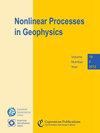使用数据驱动方法选择和加权动力学模型
IF 2.4
4区 地球科学
Q3 GEOSCIENCES, MULTIDISCIPLINARY
引用次数: 0
摘要
摘要在地球科学领域,多模型组合有助于探索一系列结果的稳健性。为了获得所研究动态系统的合成和改进表示,通常会对模型进行加权。最简单的方法,即 "模型民主"(model democracy),赋予所有模型相同的权重,而更先进的方法则是根据与现有观测数据的一致性来确定权重。在这里,我们主要讨论如何确定大西洋经向翻转环流理想化模式的各种版本的权重。具体做法是在数据同化框架内,利用集合卡尔曼滤波器(EnKF),根据合成观测数据(由其中一个模型版本生成)来评估它们的性能。与传统的数据同化不同,我们使用基于短期轨迹目录的模拟方法来实现数据驱动的预测。这种方法既能有效模拟模式的动态变化,又能降低计算成本。对于每个模型版本,我们都会计算一个局部性能指标(即上下文模型证据),以比较观测数据和模型预测结果。该指标基于创新似然,对模型动态的差异非常敏感,并考虑了预测和观测的不确定性。最后,利用模型性能和模型共同依赖性计算权重,然后根据长期模拟的平均值进行评估。结果表明,该方法在确定最能复制观测到的短期变化的数值模拟方面表现良好。此外,在重建缺失分布时,它优于基准方法,如基于模型民主或气候学的策略。这些研究结果鼓励将所提出的方法应用于未来更复杂的数据集,如气候模拟。本文章由计算机程序翻译,如有差异,请以英文原文为准。
Selecting and weighting dynamical models using data-driven approaches
Abstract. In geosciences, multi-model ensembles are helpful to explore the robustness of a range of results. To obtain a synthetic and improved representation of the studied dynamic system, the models are usually weighted. The simplest method, namely the model democracy, gives equal weights to all models, while more advanced approaches base weights on agreement with available observations. Here, we focus on determining weights for various versions of an idealized model of the Atlantic Meridional Overturning Circulation. This is done by assessing their performance against synthetic observations (generated from one of the model versions) within a data assimilation framework using the ensemble Kalman filter (EnKF). In contrast to traditional data assimilation, we implement data-driven forecasts using the analog method based on catalogs of short-term trajectories. This approach allows us to efficiently emulate the model's dynamics while keeping computational costs low. For each model version, we compute a local performance metric, known as the contextual model evidence, to compare observations and model forecasts. This metric, based on the innovation likelihood, is sensitive to differences in model dynamics and considers forecast and observation uncertainties. Finally, the weights are calculated using both model performance and model co-dependency and then evaluated on averages of long-term simulations. Results show good performance in identifying numerical simulations that best replicate observed short-term variations. Additionally, it outperforms benchmark approaches such as strategies based on model democracy or climatology when reconstructing missing distributions. These findings encourage the application of the proposed methodology to more complex datasets in the future, like climate simulations.
求助全文
通过发布文献求助,成功后即可免费获取论文全文。
去求助
来源期刊

Nonlinear Processes in Geophysics
地学-地球化学与地球物理
CiteScore
4.00
自引率
0.00%
发文量
21
审稿时长
6-12 weeks
期刊介绍:
Nonlinear Processes in Geophysics (NPG) is an international, inter-/trans-disciplinary, non-profit journal devoted to breaking the deadlocks often faced by standard approaches in Earth and space sciences. It therefore solicits disruptive and innovative concepts and methodologies, as well as original applications of these to address the ubiquitous complexity in geoscience systems, and in interacting social and biological systems. Such systems are nonlinear, with responses strongly non-proportional to perturbations, and show an associated extreme variability across scales.
 求助内容:
求助内容: 应助结果提醒方式:
应助结果提醒方式:


